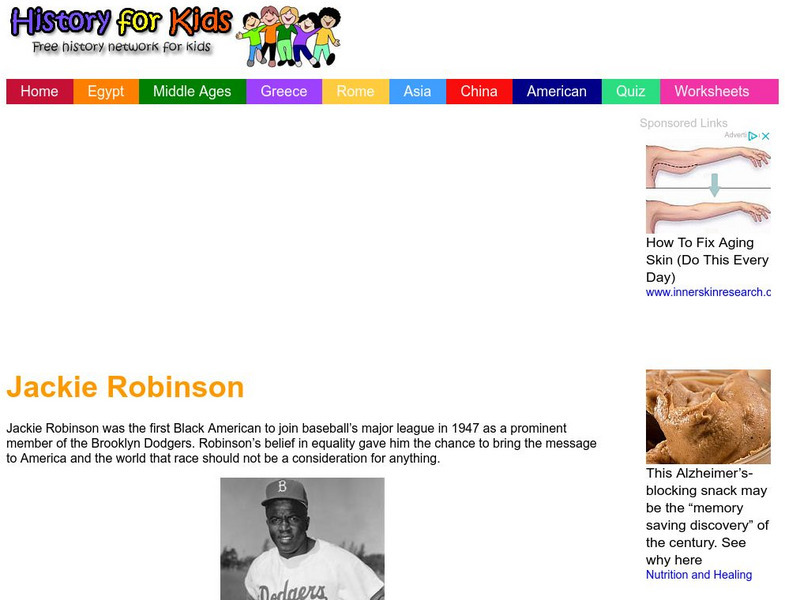Hi, what do you want to do?
Houghton Mifflin Harcourt
Smart Solutions: English Language Development Lessons (Theme 6)
Smart Solutions is the theme of a unit created to meet the needs of English language earners. Through a series of lessons, scholars follow a routine—move, speak, and listen— to cover topics including stores, shops, celebrations, pets,...
Learning Zone Express
The Basics of Sewing
This resource is a stitch. Kids learn the basics of hand and machine sewing, how to sew on buttons, how to construct and repair clothing, and how to use patterns to create decorative ornaments.
Polk County Education
Winter Survival/Hike
Hibernation isn't just about staying fed, it's about staying warm. Young environmentalists explore the importance of staying warm in the wilderness with a short lesson about surviving in the wild. Using gelatin to represent warm-blooded...
Curated OER
Identify the Parts of a Newspaper features of informational text, newspaper format
Young readers make sense out of the wealth of information in newspapers with this helpful reference document. Pointing out basic features like headings, articles, bylines, and captions this resource is a...
ProCon
School Uniforms
Americans spend around one billion dollars each year on school uniforms, but are they necessary? As pupils research the debate topic, they form their own opinions. They review the history of school uniforms and discover the top pro and...
Tennessee Pediatric Society Foundation
Commit to be Fit
Staying physically fit takes time, energy, and commitment...but it can also be a lot of fun! This list includes 11 simple ways to stay motivated to exercise and will help your young athletes commit to a life of fitness and healthy living...
Smithsonian Institution
Solomon G. Brown: Letter Writing
Personal correspondence in the form of letters is not as common as it once was. This resource presents an opportunity for you to introduce your class to letter writing and cover topics in social studies. Learners read a letter written in...
American College of Sports Medicine
Selecting and Effectively Using Hydration for Fitness
How much water does your body lose during exercise? How much should you hydrate during and after exercise? Address the importance of hydration with your young athletes using this informative handout.
Center for Learning in Action
Challenge with Solids, Liquids, and Gases
There's a container for every matter—liquid, solid, and gas. Pupils design three different containers, each with the capability to hold one of the states of matter, and share their design with the class.
Willow Tree
The Fundamental Counting Principle
How many different outfits can you make with what you have in your closet? The Fundamental Counting Principle can help you find an answer! Learners find totals using the Fundamental Counting Principle with problems that can have...
Edgemont Elementary School
Scientific Method Unit
Four out of five teenagers experiment with science by accident. This unit teaches the five parts of the scientific method through examples, guided practice, independent practice, and then through a hands-on experiment. Each step is...
National Institute of Open Schooling
Periodic Table and Atomic Properties
An in-depth lesson, the fourth activity in a series of 36, begins with teaching how the periodic table's arrangement came to its current design. Using this knowledge, pupils then move on to analyze the arrangement of elements to their...
NPR
Theatre Vocabulary
From actor to volume, the 90 terms on a theatre vocabulary list are must knows for any student of the dramatic arts.
Curated OER
Blakesley Hall
In this history worksheet, students read about Blakesley Hall, which is a home built during the 1600s in Yardley. Students learn about the different rooms in the hall and the layout of the home.
Curated OER
Laundry Detergent: ESL Read Aloud
In this laundry detergent ESL read aloud worksheet, students read a one page text that describes a man who does his laundry, with problems. There are no questions to answer.
Vroma Project
V Roma Project: Roman Clothing
This resource outlines the different styles of clothing worn by the people of ancient Rome. Pictures, diagrams, and explanations are provided for a detailed account of ancient fashions. Go on to "Roman Clothing, Part II" for more about...
Other
Plimoth Plantation: What to Wear?: Wampanoag and Pilgrim Clothing
Compare the clothing of the Wampanoag people with the English clothing of the Pilgrims in the 1600s. Photographs provide clear images of how they would have dressed.
Colonial Williamsburg Foundation
Colonial Williamsburg: Looking at 18th Century Clothing
Site from the Colonial Williamsburg Museum that provides pictures and explanations of colonial clothing.
Other
Native Languages of the Americas: Native American Indian Clothing and Regalia
Provides an overview of Native American regalia, clothing, footwear, and headwear, including some contemporary styles. Images link to online stores and other web pages.
Native American Art and Technology
Native Tech: Regional Overview of Native American Clothing and Regalia
Explains the importance of clothing worn by Native Americans for special occasions, and what the style, symbols, and ornamentation signify about the person wearing it.
Stephen Byrne
History for Kids: Native American Clothing
History for Kids provides an overview summarizing the types of materials used and clothing worn by Native Americans as well as a short fact list.
Stephen Byrne
History for Kids: Roman Clothing
History for kids presents an overview of the clothing worn in Roman society. Students can find details of the type of materials used, explore the relationship between style, gender and class, as well as note examples of the trends of the...
Stephen Byrne
History for Kids: Greek Clothing
History for Kids presents a brief look at ancient Greek clothing, teaching kids the functionality of everyday wear. Teacher resources included.
Mayflower History
Mayflower history.com: Clothing
A description of clothing worn by Pilgrim women, men, and children.
Other popular searches
- Winter Clothing
- Clothing Designers
- Appropriate Clothing
- Renaissance Clothing
- Clothing Vocabulary
- Traditional African Clothing
- French Clothing
- Clothing Manufacturing
- 18th Century Clothing
- Clothing Choices
- Clothing of Ancient Cultures
- Clothing Change




























